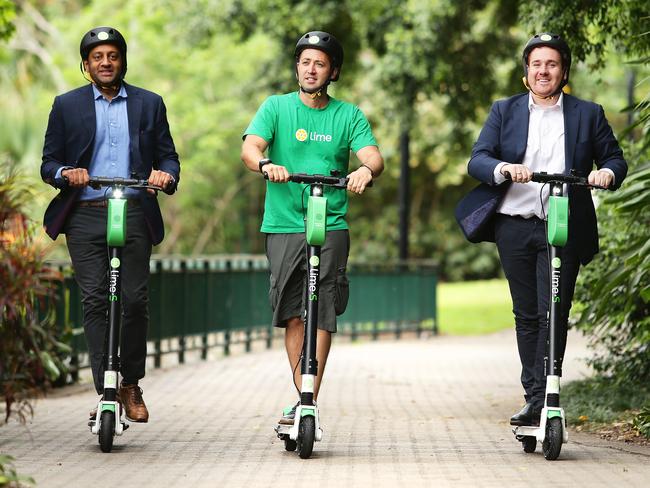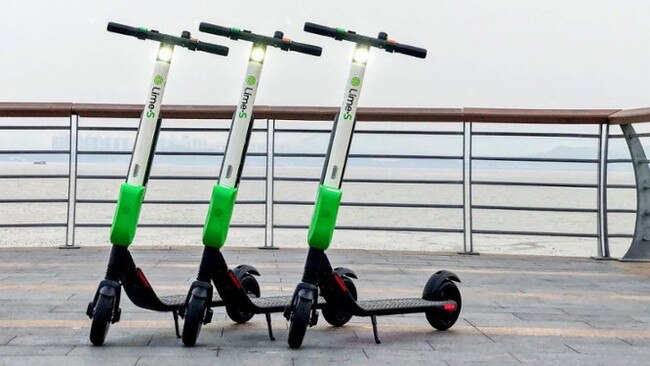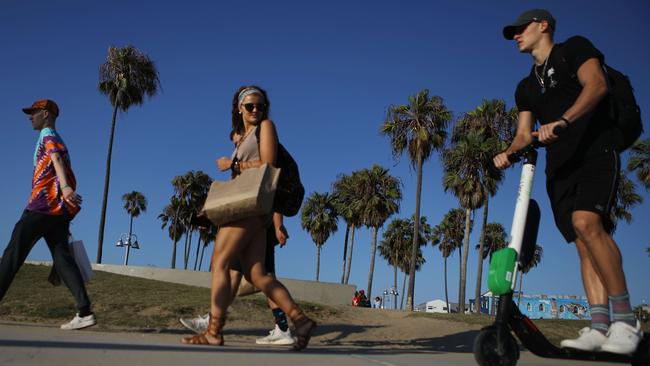Lime fights to bring e-scooters to Queensland streets
Somewhere in a warehouse in Brisbane, a public transport revolution awaits approval from regulators to hit Queensland – and it’s exciting and scaring authorities in equal proportions, writes Steven Wardill.
CM Insight
Don't miss out on the headlines from CM Insight. Followed categories will be added to My News.
SOMEWHERE in a warehouse in Brisbane a public transport revolution awaits approval to hit Queensland’s streets.
Hundreds of so-called e-scooters have been stockpiled by Lime, the company considered the standard-bearer of this two-wheeled insurgency that is sweeping the world.
These scooters represent the evolution of the early 2000s kids’ toy craze.
However, this time they’re for adults, with battery-powered motors capable of clocking about 25km/h.
Everything you need to know about Lime bikes and scooters popping up in our cities
Scooter revolution headed to Brisbane … maybe
Lime and other companies such as Bird, Spin, Skip and Scoot, have hit the streets of dozens of cities across the US and Europe over the past 18 months with their rentable, dockless scooters.
Now that revolution is descending on Australia, with Lime looking to launch in Brisbane, the Gold and Sunshine coasts and Cairns.
The scooters excite and scare transport authorities in equal proportions.
They provide a solution to the “last mile” conundrum that transport planners talk about – the gap between where buses and trains drop their passengers and where commuters actually want to go.
However, wherever the scooters have hit city streets there have been concerns about safety, about riders being under the 18-year age limit tearing along footpaths or cruising streets without a helmet.

Right now rentable scooters – in fact, most electric scooters being produced for adults – are illegal on our streets. Uniform laws in every state, drafted at a time when these devices were just children’s toys, limit electric scooters to 200 watts and speeds of less than 10km/h.
Lime’s Australian head of expansion, Mayank Mittal, and government affairs director Mitchell Price have been in talks with federal, state and council authorities seeking to change those rules. They are hopeful the regulations will soon be amended, and they see Brisbane as a city with the topography perfect for the scooters.
Mittal says initially, there’s a “nostalgia” element when people hop on the scooters. Generation Z have grown up but they still love to ride.
However, Mittal says people quickly discover the convenience, and Brisbane has all the hallmarks of a city where the scooters will be rapidly adopted.
For example, the ability to travel from the city to South Bank, Central Station to QUT’s Garden Point campus, an Eagle St office to a George St restaurant.
“The city has had some great success with city cycles and we think we can add to that,” Mittal told The Courier-Mail.
He says in some of the cities where Lime has launched people are taking up to 10 rides a day.
“We are seeing a lot of residual usage,” he says. “We are seeing people riding multiple times a week once we do bring it to a city.”

Price says Lime will look beyond just the target cities when the time is right. “We are about bringing this premium product to any major city or regional town where it will help them reduce congestion or where there is limited public transport,” he says.
“Essentially, what Lime is is free public transport for cities which are provided to commuters for a small price.”
Price says the company is not looking for any financial help to kick off in Queensland.
“We are not looking for any money,” he says. “We are looking to help them solve their ‘first mile, last mile’ problem in the city.”
Most of the electric scooter companies charge $1 to start and then a per minute fee. The scooters are distributed each morning and collected each night. Lime deploys “juicers” to pick up and charge its scooters when the batteries run flat.
The company recently launched in New Zealand, where authorities quickly changed their regulations.
However, just like elsewhere, there have been reports of injuries.
In San Francisco, where Lime, Bird and Spin simultaneously launched in March without the blessing of authorities, the scooters were ordered off the streets just a few months later because of public concerns about cluttered footpaths and safety.

City authorities then introduced a licensing regime, and two other companies, Scoot and Skip, won the tender to operate in San Francisco’s inner city. However, this was but a blip for the e-scooter revolution.
Lime, which began with share bikes on US university campus, has a market capitalisation of a staggering $4 billion after launching in 125 cities throughout 14 countries. Ford recently purchased Spin for $100 million.
Mittal and Price say the company has worked to improve its models, and now provides on-the-ground safety staff to work with riders.
“It is imperative that we are spreading that message about safety,” Mittal says.
The scooters have been improved so they can no longer be left upended on footpaths for long.
Local convenience stores are given contracts to provide helmets.
“Our scooter has an anti-tilt feature,” Price says. “If one of the scooters is pushed down, our team is able to get there within 30 minutes.
“And through our app we are able to do in-app messages that encourage people not to use the footpath and to use a helmet.”
After stocking a warehouse, Lime is obviously confident that Queensland will be the next destination for its revolution.
All they need is for regulators to get on their bikes – or, in this case, scooters – and make it happen.
SMOOTH RIDE ON THE STREETS
● LimeBike was founded in January 2017, offering sharable bikes at the University of Northern Carolina campus.
● The company rebranded as Lime after launching dockless rentable electric scooters in San Francisco.
● Lime’s e-scooters are now in 125 markets across 14 countries and recently clocked up 20 million rides.
● Riders download an app and use it to find the nearest scooter and check its remaining battery life.
● Cost is $1 to start up and 30 cents per minute, which is charged to a credit card.
● Riders must be 18 years of age and abide by local traffic laws, such as wearing a helmet.


